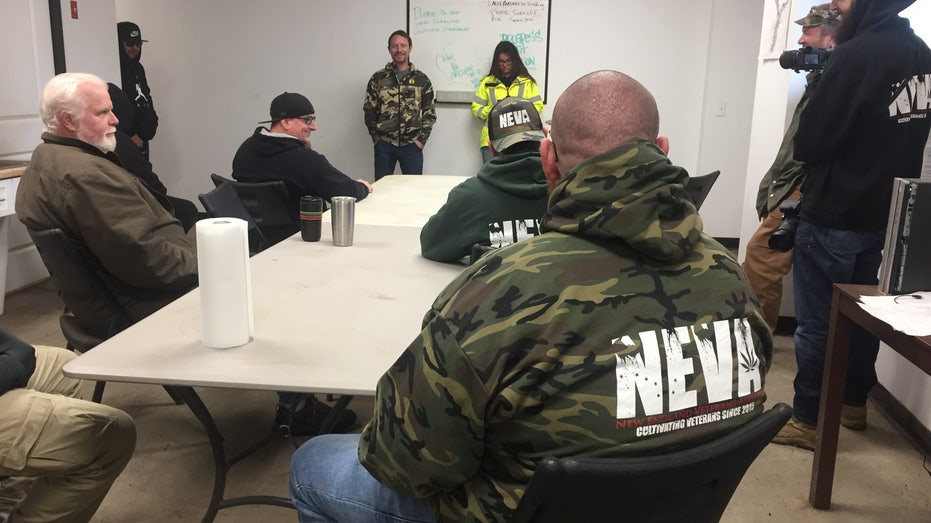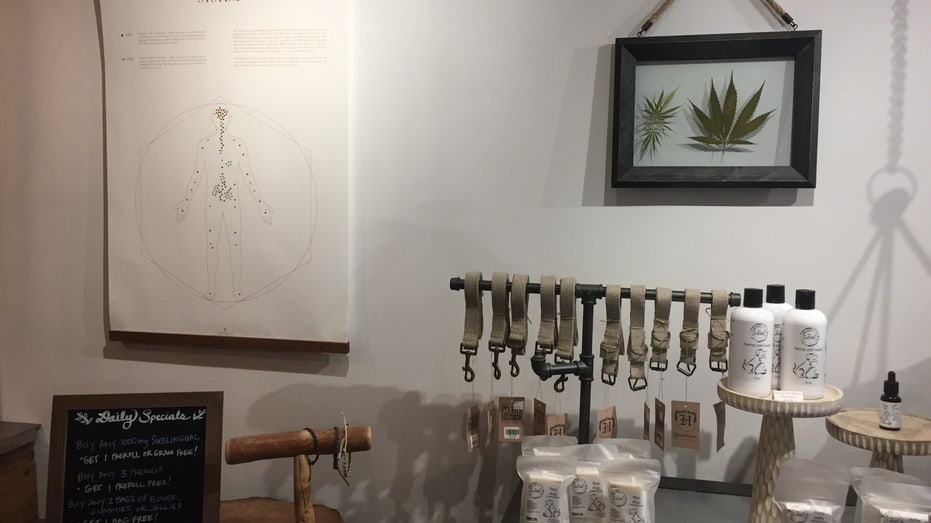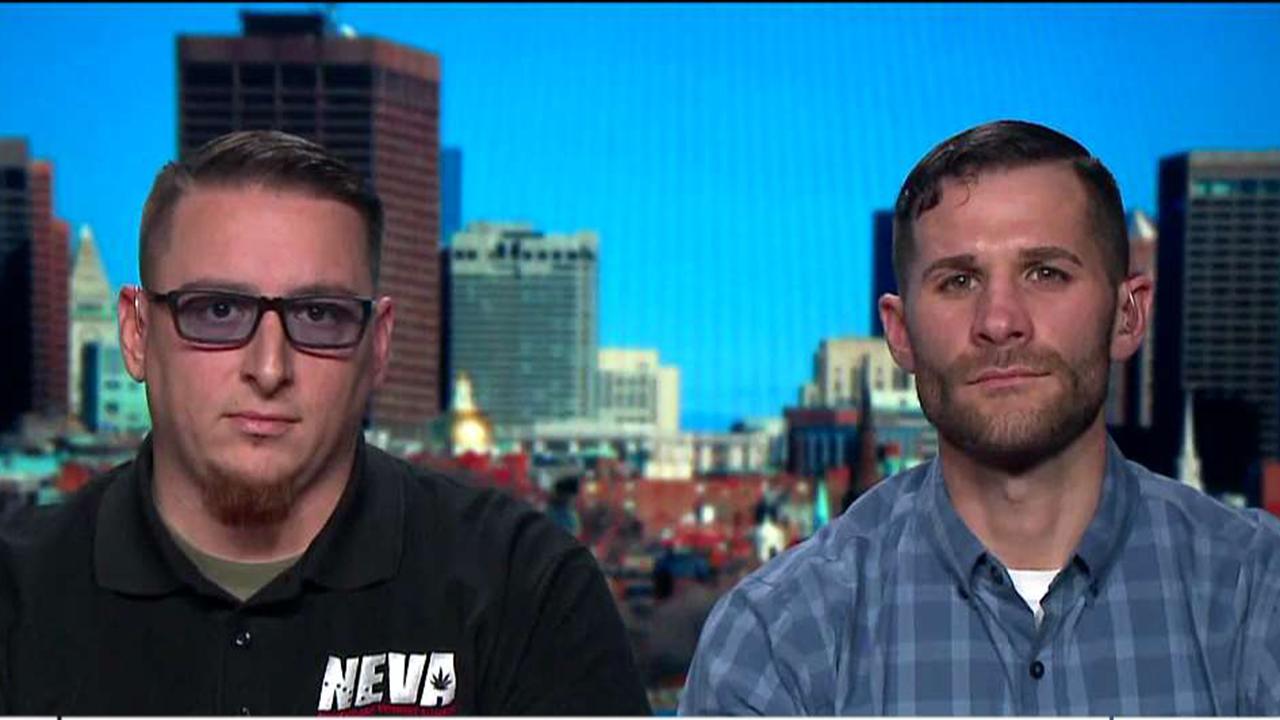US military veteran and marijuana advocate pushes 'cultivation therapy'
Cultivate (cannabis), or die.
That is perhaps not the literal ethos of New England Veterans Alliance USA, a non-profit and pro-marijuana veterans support group with a growing following nationwide.
And while smoking or otherwise ingesting cannabis is obviously part of the philosophy, the group’s tireless founder is now focusing his efforts on a related therapy that he says can provide unmatched relief, and that doesn’t necessarily require getting high.
"Being able to use that to help heal yourself, and also being able to educate another veteran on how to do it, goes back to the whole mentality of teaching a man to fish rather than giving him a fish."
“We call it cultivation therapy,” says Derek Cloutier, a combat veteran and founder of NEVA network. Cloutier says for people with a military background, in particular, the process of growing and caring for a plant from seed to harvest can be more therapeutic than consuming the marijuana flower itself.
“It’s almost more relief in a way because you grew it, you put love into it, you put passion into it and you had to keep it alive,” Cloutier says, a process that syncs up naturally with the mindset of a soldier.
After finding himself in support groups for soldiers that he says were simply drinking clubs in disguise, Cloutier created NEVA to spread his gospel of ganja as an alternative and less self-destructive form of relief.
That relief comes from not only consuming the plant itself, but getting veterans out of the house to connect with each other in what Cloutier believes are more positive and collaborative environments. Taco nights, raffles and stand-up comedy routines are regular features.
Cloutier also organizes group outings that sound more like high school field trips, focusing not just on cultivation but also on professional development, and attracting veterans with backgrounds ranging from Vietnam to Afghanistan.

Veterans learn about organic farming during a tour of the Roots Organics facility in New York, organized by the pro-marijuana veterans advocacy group New England Veterans Alliance, October 2019. (Fox News/Alex Diaz)
In late October, as the leaves of trees in the Catskill Mountains turned a fiery red, Cloutier loaded up a caravan of more than a dozen NEVA members for a journey to upstate New York – a place where marijuana is still not exactly legal.
Fox News tagged along for the ride, and while there were plenty of hemp fields and fragrant breezes that day, the group’s agenda was explicitly focused on learning about the benefits and intricacies of organic farming – not just marijuana.
Representatives from Roots Organics gave the group a first-hand look at their facility and explained everything from their worm-farming operation (North America’s largest) to how organic soil can help home growers.
“You aren’t putting any more toxins in your body, especially if it’s medicinal cannabis,” Adam Sutton of Roots told the vets. “You don’t want to make a sick person sicker,” he added.
After the group’s tour of the Roots facility, and a quick photo-op at a nearby hemp field, the caravan made its way to a former apple-farm-turned-high-end-hemp-cultivation facility run by a boutique herbal medicine store called The Leaf, in Beacon, New York.

The founder of herbal medicine store The Leaf in Beacon, NY, gave NEVA veterans a tour of both his hemp processing facility, as well as his storefront, October 2019. (Fox News/Alex Diaz)
Leaf founder Grant McCabe spoke one-on-one with the vets about his business and the intricacies of producing CBD, a hemp/cannabis byproduct taking retail shelves across the country by storm.
McCabe’s company produces its own high-end CBD products using locally-sourced plants, and explained to vets the importance of using locally or home-grown products to ensure they aren’t ingesting dangerous chemicals as a result of using unregulated overseas products.
McCabe was so taken with NEVA’s mission, and the group’s enthusiasm, that he is now working on a give-back program to benefit the group itself and local vets who may be curious about his hemp-based products.
Cloutier’s selfless efforts with NEVA have inspired a variety of partners, like Roots Organics, to contribute to his cause. Thanks to those collaborations, Cloutier was recently able to launch a major new undertaking called the Veterans Cultivation Program (VCP).
With the VCP, Cloutier hopes to provide veterans, who may not have experience growing anything, to the marijuana cultivation process.
The VCP will not only provide the equipment necessary to start veterans’ first grow at home, Cloutier says, participants will receive in-home guidance and mentoring from a fellow NEVA veteran who has done it before.
To kick-start the program, Cloutier chose five disabled veterans from a pool of applicants, and awarded them earlier this month with complete home cultivation set-ups. The high-end equipment NEVA was able to provide came free of charge thanks to its supporters.
Unfortunately for veterans who may be looking to explore the effects of cannabis in one of the many states where it is medicinally legal, the Department of Veterans Affairs does not allow its doctors to prescribe, or those under its care to obtain marijuana products using VA benefits.
In fact, you can still be arrested for possession of marijuana in a VA facility even in states where general possession and/or recreational consumption are completely legal.
"The U.S. Department of Veterans Affairs is required to follow all federal laws including those regarding marijuana. As long as the Food and Drug Administration classifies marijuana as Schedule I VA health care providers may not recommend it or assist Veterans to obtain it."
Those obstacles are what makes home cultivation so important for veterans, Cloutier says, and what drove him to start a program like the VCP.
Legislation is being introduced to change the VA’s attitude, and critics concede that the department’s rules have at least been tweaked to allow veterans to discuss marijuana with VA doctors without fear of losing their benefits.
But for veterans like Cloutier, who would prefer to smoke a joint rather than swallow handfuls of prescribed pills, growing his medicine for himself has been the key to finding peace of mind while avoiding the premium prices he is forced to pay because of the VA’s resistance to prescribing it.
“Being able to use that to help heal yourself, and also being able to educate another veteran on how to do it, goes back to the whole mentality of teaching a man to fish rather than giving him a fish,” Cloutier says.





















